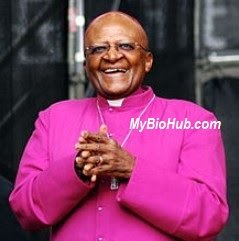Desmond Mpilo Tutu was born on 7 October, 1931 in Klerksdorp, a city in northwest South Africa.His mother, Allen Dorothea Mavoertsek Mathlare, was born to a Motswana family in Boksburg. His father, Zachariah Zelilo Tutu, was from the anaMfengu branch of Xhosa and had grown up in Gcuwa, Eastern Cape.
Born of mixed Xhosa and Motswana heritage to a poor family in Klerksdorp, Tutu moved around South Africa as a child. Entering adulthood, he trained as a teacher and married Nomalizo Leah Tutu, with whom he had several children. In 1960, he was ordained as an Anglican priest and in 1962 moved to the United Kingdom to study theology at King’s College London. Tutu polarized opinion as he rose to notability in the 1970s. Apartheid supporters despised him, many white liberals regarded him as too radical, and communists criticized his anti-communist stance.
He is a South African Anglican cleric and theologian known for his work as an anti-apartheid and human rights activist. He was the Bishop of Johannesburg from 1985 to 1986 and then the Archbishop of Cape Town from 1986 to 1996, in both cases being the first black man to hold the position. Theologically, he sought to fuse ideas from black theology with African theology; politically, he identifies as a socialist.
In December 1960, Edward Paget ordained Tutu as an Anglican minister at St Mary’s Cathedral. He was then appointed assistant curate in St Alban’s Parish, Benoni where he was reunited with his wife and children; they lived in a converted garage.
In 1966, the Tutus left the UK and traveled, via Paris and Rome, to East Jerusalem. Spending two months in the city, Tutu studied Arabic and Greek at St George’s College. He was shocked at the level of tension between the city’s Jewish and Arab citizens. From there, the family returned to South Africa, spending Christmas with family in Witwatersrand. They found it difficult readjusting to a society where they were impacted by segregation and pass laws.
The TEF offered Desmond a job as their director for Africa, a position that would require relocating to London. Tutu agreed, although was initially refused permission to leave by the South African authorities; they regarded him with suspicion ever since his involvement in the Fort Hare student protests and were also increasingly antagonistic toward the WCC, which ran the TEF, because it had condemned apartheid as un-Christian.



